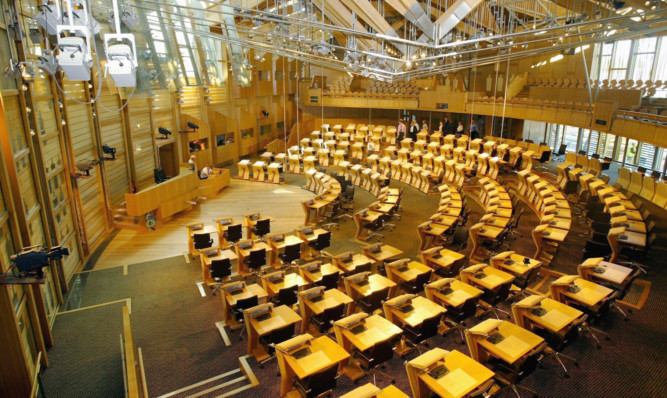
Labour’s tax move shifts the balance of power.
Labour is set to give way over the granting of new tax powers to the Scottish Parliament as the Smith Commission draws to a close this week.
The Sunday Post has learned that Labour will relax the position set out in its initial submission to Lord Smith and back plans to give Holyrood major new powers to determine how much Scots pay in income tax.
However, internal negotiations are still ongoing to determine how far the party will move its position and may continue right up to the midweek deadline with senior figures trying to convince colleagues to match Tory, SNP and Lib Dem plans to devolve total control over income tax to Holyrood.
Party sources insist that rather than caving in, they are acting for the good of the country.
Negotiations at the Smith Commissions’s Edinburgh HQ are expected to go to the wire this week.
An all-day session on Wednesday will see representatives from the main parties attempt to come to an agreement which Lord Smith can publish the following day.
The Smith proposals are likely to hand a raft of new powers to Holyrood over welfare, land reform and health and safety legislation.
But grabbing the headlines will be tax because it impacts folks’ pockets and because it’s been the most fiercely contested part of the negotiations.
Currently, the Scottish Parliament has the power to vary income tax rates by 3p in the pound, though it’s never used it, and from 2016 that will be extended to 10p in the pound.
The Lib Dems, Conservatives and SNP went into the Smith Commission process demanding control over 100% of income tax.
After Labour’s MPs and MSPs went to war with each other over the issue earlier this year they eventually put forward a compromise that involved more powers to vary tax bands.
However Labour is now prepared to move. Sources close to its negotiating team are keen to frame that decision not as giving in to their opponents but being flexible for the common good.
They claim it’s vital the Smith negotiations end in agreement as a necessary step in healing the divisions caused by the fierce referendum campaign. Others see it differently.
Professor Charlie Jeffrey, fellow at Edinburgh University’s centre for constitutional change, will publish a pamphlet online on the Smith process on Tuesday.
He explained why he thinks Labour will shift position. He said: “It’s largely due to the relative credibility of the SNP and Labour at the moment. The SNP are at one end of the spectrum and that delivers a pull on the other parties.”
Any plans for giving Holyrood more power over tax would have to be signed off by the Treasury. Last week, Chancellor George Osborne hinted that won’t be a problem, telling The Sunday Post he was “confident in the Smith process”.
Welfare is also likely to see further devolution.
Gordon Brown last week repeated his call for housing benefit and the Work Programme, which aims to find jobs for people, to be devolved and that’s likely to be heeded.
However, it will raise questions about the detail. At a Westminster meeting last week at which the PM was quizzed by select committee heads, Dame Anne Begg pointed out that devolving housing benefit would require a degree of unravelling for Iain Duncan Smith’s already troubled flagship Universal Credit scheme.
Professor Jeffrey reckons there could be a cop-out in the offing come Thursday. He explained: “They could take a high level approach and leave the detail still to be worked through. It may be more a statement of intent.”
But sources close to the negotiations told The Sunday Post the final agreement will be “substantial”.
Government lawyers, led by advocate general and former deputy first minister Jim Wallace, now Lord Wallace, are already working on how any proposals can be implemented.
Lord Wallace said: “My office is already starting to look at possible scenarios. We’re under no illusion that we’ve got a lot of work to be done in a short period of time. We’re making sure we’re not twiddling our thumbs.”
Publishing so-called heads of agreement on Thursday would be ahead of the St Andrew’s Day deadline set by Gordon Brown in the run up to the referendum and keep the Unionist parties on track to deliver the Vow
the promise of more powers for Edinburgh made by Westminster leaders David Cameron, Ed Miliband and Nick Clegg.
Some in the SNP are now dubbing them ‘the Three Amigos’. That could be a sign the party will do down the Smith proposals whatever they are.
Lord Wallace added: “The one principle it must be consistent with is the outcome of the referendum which is that the United Kingdom must remain united and that’s not going to satisfy the nationalists who will continue to argue the case.”
The next deadline is for the Government to turn Lord Smith’s recommendations into legislation by Burns’ Night at the end of January.
Lord Wallace has a novel way of summing up the current schedule.
He explained: “When we talk about heads of agreement by St Andrew’s Day and draft clauses by Burns Night,
“I always remember that in 1977 Mull of Kintyre reached number one in the week of St Andrew’s Day and fell away from number one the week of Burns Night so it’s the period of time which Mull of Kintyre was at number one in the charts.
“It’s a very tight timetable. It will focus minds. It will have to be done. There was a clear undertaking given which we are absolutely intent on honouring.”

Enjoy the convenience of having The Sunday Post delivered as a digital ePaper straight to your smartphone, tablet or computer.
Subscribe for only £5.49 a month and enjoy all the benefits of the printed paper as a digital replica.
Subscribe